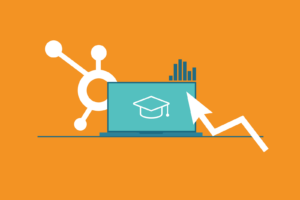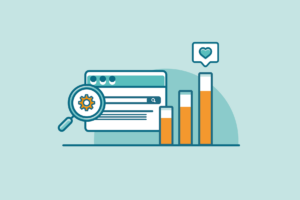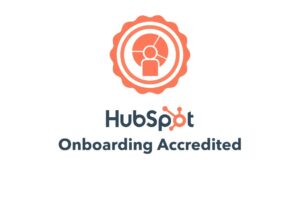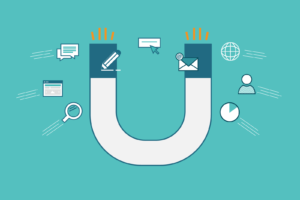
An inbound marketing specialist is responsible for attracting qualified prospects to your website, and helping you convert them into leads and customers, using relevant and helpful online content.
The job itself and how inbound specialists (often referred to as inbound marketing consultants, marketers or strategists) approach their goals differs vastly. This is because there are innumerable potential approaches to inbound marketing, which are dependent on goals, resources and a marketer’s specialism.
Inbound marketing uses a variety of tactics across multiple channels, so campaigns inevitably differ. In one campaign an inbound specialist might spend most of their time writing copy for landing pages, emails and blog posts. In another they might monitor social media accounts, work on automated workflows and manage CRM systems. This depends how involved a business already is with digital marketing - whether they are launching a new site or working on refining their approach with more advanced inbound tactics, such as automation.
Where some inbound marketers and agencies focus on certain tactics, such as SEO, PPC or blogging, others focus on B2B or B2C clients, and others still only work within specific industries.
With so much variety in this field, you’d be forgiven if you were still a little confused about what inbound specialists actually do. With that in mind we’ll try and provide further clarity by focusing on their main duties, their goals and the tactics they can use to achieve them.
The goals of an inbound marketing specialist
So what do inbound specialists want to achieve? What exactly are their goals?
Gain customers and revenue
The most important goal for an inbound marketer is to increase the number of customers being generated from their client’s website. More customers means more revenue, and let’s face it, that’s what it’s all about. Or at least that’s the primary goal of inbound marketing; let’s take a look at the others.
Increase traffic and conversions
A specialist will discuss a business’ specific goals in an inbound marketing consultation, but every company, and every inbound marketer wants to see an increase in traffic and conversions.
For the marketer it means they are doing their job well, and for a business it means they’re making more money and their marketing investment is paying off.
Attract qualified leads
Going to all the effort of creating buyer personas, conducting keyword research and mapping and creating relevant, useful content is all designed to bring in the right traffic. Websites don’t want just any visitor - they want those who are likely to convert and become customers. Attracting qualified leads is therefore another solid inbound goal.
Provide helpful content
Inbound marketing is all about attracting custom by being genuinely helpful and showing that you care about your audience. If a company can do this by providing and promoting content that really helps them - content that they need right now - this should lead to improved website performance.
Their responsibilities
Despite the almost endless options of ways to tackle strategy, the responsibilities of inbound marketing specialists are finite. Let’s take a look at what their role involves.
Manage numerous campaigns at once
Most work on more than one campaign at any given time. They are in charge of a client’s overall inbound strategy, which should encompass numerous campaigns over a planned period of time.
Marketers in agencies will often be working on a number of different clients at the same time too, requiring a decent amount of planning and organisation.
Create buyer personas
Helping clients craft buyer personas is an essential element of inbound marketing strategy.
A buyer persona is a fictional projection of your ideal customer, created using data about your current customers and the industry you’re in.
These personas allow you to create content that is genuinely useful for your target audience, which increases your chances of attracting qualified leads (more on those soon) and converting visitors into happy customers.
Keyword research & mapping for the buyer’s journey
The buyer’s journey refers to the process of research and decision making leading to a purchase. The buyer’s journey consists of three stages - Attract, Consideration and Decision.
Inbound marketers focusing on SEO conduct keyword research and mapping so they can target search terms their client’s target audience is already using to search for answers. (Check out this article for tips on automatically categorising keywords!)
By assigning keywords a buyer’s journey stage, inbound specialists can target users at all stages of their journey, deliver the content they’re searching for and thereby increase the chances of visitors engaging and converting.
Create solid content
Inbound marketing relies on great quality content that helps users discover and solve a problem. This means that inbound specialists are regularly creating or commissioning new content (often based on keyword research).
Many build a content/editorial calendar around a campaign, which could include numerous different formats, such as blog posts, whitepapers, ebooks, reports, webinars, videos and infographics.
Manage various tactics
As well as managing numerous campaigns and clients, inbound marketers must understand and manage various different tactics. We’ll look more closely at all the tactics available soon, but they commonly include SEO, social media, blogging and email marketing.
Report & analyse
Reporting is of course an important duty for an inbound expert. Commonly, monthly reports are sent to clients detailing monthly activity and performance against KPIs.
Inbound marketers must be analysts to report accurately, but also to enable them to make recommendations based on their insights into the data gathered through website analytics. They should always be looking for ways to improve a website’s performance and looking for new campaign ideas.
How inbound marketing specialists can achieve their goals
The inbound marketing methodology is split into four phases:
- Attract - attract prospects who are likely to become leads
- Convert - get prospects to engage with your website to convert them into leads
- Close - turn them into customers with helpful content and guidance
- Delight - retain customers and make them promoters of your brand by delighting them throughout their buyer’s journey
We’ve previously written about 17 essential inbound marketing tactics, so let’s distil the main points in the tables below.
Here you can see the tactics available to inbound marketing specialists, the methodology phases they are most commonly associated with, and why the tactics are useful at this stage.
Attract
| Tactic | Why? | ||
| SEO | Essential to increase visibility in search engine results and drive traffic | ||
| PPC | Valuable additional exposure | ||
| Social media | Amplifies content and exposure | ||
| Blogging | Attracts new visitors with educational, useful content | ||
Convert
| Tactic | Why? |
| Content offers | Get visitors to share their information in return for a valuable content asset (such as an ebook or free tool) |
| Landing pages | Can be created to target different personas with tailored content offers |
| Calls to action (CTAs) | CTAs can target buyer’s journey stages to guide users to the next phase |
| Forms/email capture | Email pop-ups and capture forms with content offers or subscription options encourage visitor engagement |
Close
| Tactic | Why? |
| Email marketing | Useful, relevant emails can help nudge someone from lead to customer |
| Marketing automation | Emails, social media posts and more can be automated to nurture leads |
| CRM integration | A vital hub of customer interactions to help close leads |
| Sales alignment | Shared information allows marketing and sales to collaborate and close more easily |
Delight
| Tactic | Why? |
| Feedback | Listening to feedback is vital for improving customer service |
| Surveys | Invaluable for customer service but also for improving inbound strategy |
| Customer service programmes | Ensures a consistently high standard of customer service |
| Referral programmes | Discounts/vouchers for referrers helps you retain existing and attract new customers |
If you would like to see how some of these tactics have been implemented feel free to read our article on excellent inbound marketing examples, and for more inbound insights just take a look at our blog.
Alternatively get in touch for a chat or ask us a question on Twitter!




